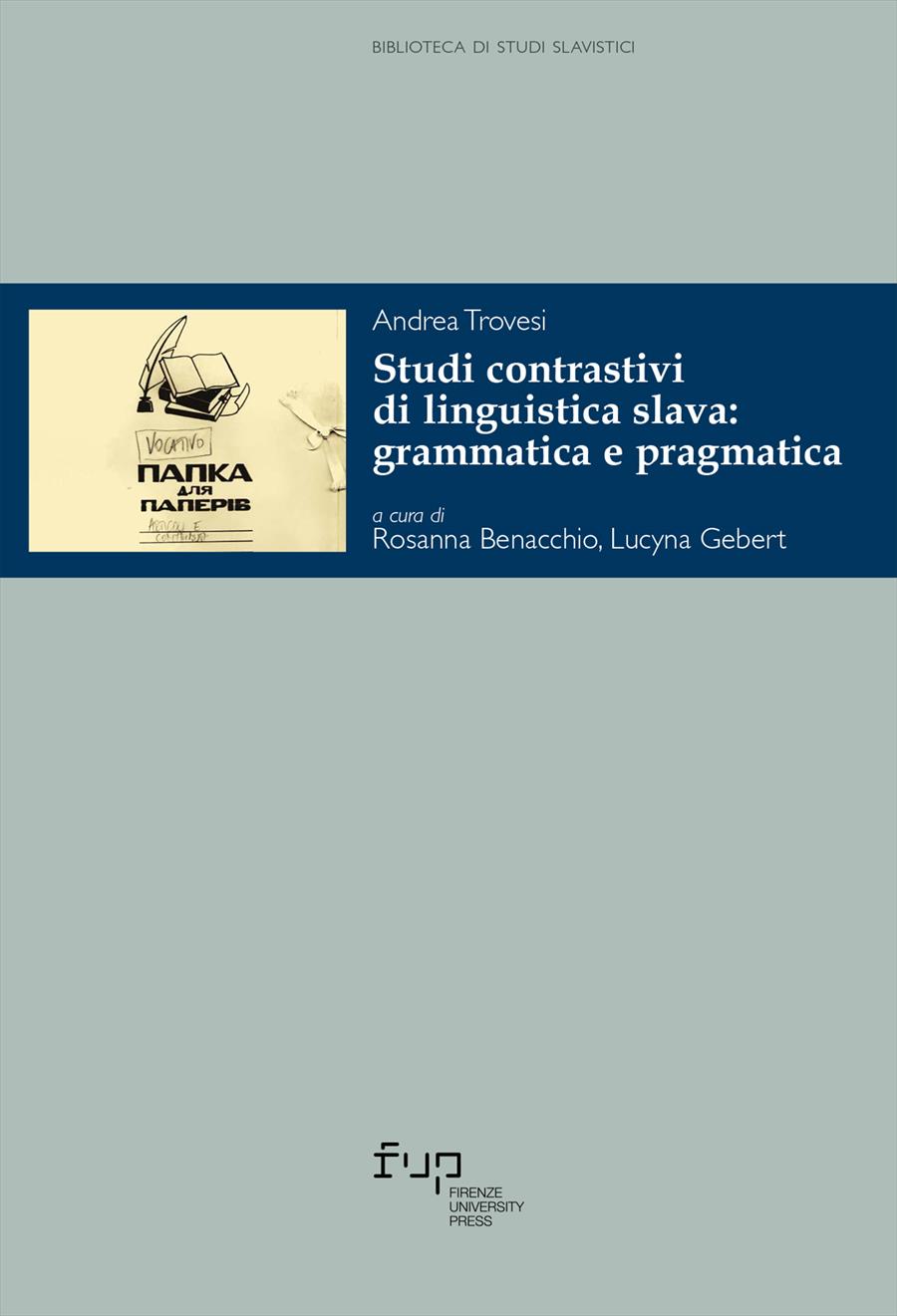Desinenze di vocativo come formanti antroponimici. I nomi propri maschili in -e e -o nelle lingue slave
- Andrea Trovesi
- © 2023 Author(s) |
- CC BY 4.0
- DOI: 10.36253/979-12-215-0216-9.07
The study tests the hypothesis according to which the Slavic anthroponyms in -e and -o underwent evolution from vocative endings to hypocoristic derivative suffixes and then to anthroponymic formants. According to the Author, such a hypothesis can be considered entirely plausible, albeit only as a mechanism of formation parallel to and intertwined with other processes of morphemic function change. As a phenomenon observable in both diachrony and synchrony, categorial lability between vocative and word formation can thus be considered inherent in the system of Slavic languages. However the anthroponyms in -e and -o have had different diffusion and distribution in the various Slavic languages and today occupy dissimilar places within the system and varieties of each language.
- Keywords:
- Vocative endings,
- Proper noun formation,
- Slavic languages,
Sapienza University of Rome, Italy - ORCID: 0000-0001-7107-5657
- Belić, A. 1901. "Zur Entwicklungsgeschichte der slavischen Deminutiv- und Amplifikativsuffixe". Archiv für slavische Philologie 13: 134-205.
- Bernštejn, S.B. 1974. Očerki sravniteľnoj grammatiki slavjanskich jazykov. Moskva: Nauka.
- Bondaletov, V.D. 1983. Russkaja onomastika. Moskva: Prosveščenie.
- Braun, F. 1988. Terms of Address. Problems of patterns and usage in various languages and cultures. Berlin-New York-Amsterdam: De Gruyter.
- Cieślikowa, A. 1971. Derywacja paradygmatzcyna w staropolskiej antroponimii. Kraków: Polska Akademia Nauk.
- Domin, J. 1982. Słowotwórstwo hipokorystyków od imion własnych osobowych w języku polskim i rosyjskim. Gdańsk: Uniwersytet Gdański.
- Dulewiczowa, I. 1986. "Vocativus – z paralelizmów bałtycko-słowiańskich". Acta Baltico-Slavica 17: 86-98.
- Franko, I. 1906. Pryčynky do ukrajins’koj onomastyky. Ľviv.
- Giannini, S. 2003. Il mutamento morfologico. In M. Benedetti, S. Giannini, G. Langobardi (a cura di). Il cambiamento linguistico. Suoni, forme, costrutti, parole. Roma: Carocci: 89-163.
- Ilčev, S. 1969. Rečnik na ličnite i familni imena u bălgarite. Sofija: Bălgarska Akademia na Naukite.
- Jovićević, R. 1992. Lična imena u staroslovenskom jeziku. Beograd: Filološki Fakultet.
- Kovačev, P.N. 1987. Bălgarska onomastika. Sofija: Nauka i izkustvo.
- Kurzowa, Z. 1970. Polskie rzeczowniki męskie na -o na tle słowiańskim. Wrocław: Ossolineum.
- Miklošić, F. 1860. Die Bildung der slavischen Personennamen. Wien: Kaiserliche-Königliche Hof- und Staatsdruckerei.
- Milewski, T. 1969. Indoeuropejskie imiona osobowe. Kraków: Akademia Nauk.
- Mirčev, K. 1978. Istoričeska gramatika na bălgarskija ezik. Sofija: Nauka i izkustvo.
- Nahtigal, R. 1961. Die slavischen Sprachen. Abriss der vergleichenden Grammatik. Wiesbaden: Otto Harrassowitz.
- Pleskalová, J. 1988. Tvoření nejstarších českých osobních jmen. Brno: Masarykova univerzita.
- Rospond, S. 1965. "Struktura i klassifikacija drevnevostočno-slavjanskich antroponimov (imena)". Voprosy jazykoznanija 3: 3-21.
- Rospond, S. 1966. "Struktura i klasyfikacja słowiańskich antroponimów". Biuletyn polskiego towarzystwa językoznawczego 24: 203-224.
- Rozwadowski, J.M. 1961. Przyczynki do historycznej fonetyki języków słowiańskich. Rozwój pierwotnego wygłosowego *-os w słowiańskim i tzw. pierwsza wokalizacja jerów. In J. Safarewicz (a cura di). Wybór pism 2. Językoznawstwo indoeuropejskie. Warszawa: Państwowe Wydawnictwo Naukowe: 334-338.
- Rudnyćkyj, J.B. 1966. The Problem of Nom.Sg. Endings of o-Stems in Slavic. In D. Gerhardt, W. Weintraub, H.-J. Zum Winkel (a cura di). Orbis Scriptus. Dimitrij Tschižewskij zum 70. Geburtstag. München: Wilhelm Fink Verlag: 655-658.
- Šachmatov, A.A. 1957. Istoričeskaja morfologija russkogo jazyka. Moskva: Gosudarstvennoe učebno-pedagogičeskoe izdateľstvo.
- Stanislav, J. 1953. "Zo slovenskej historickej gramatiky. Hypokoristiká na -o, -e". Slavia 21(2-3): 246-251.
- Stanislav, J. 1973. Dějiny slovenského jazyka, IV. Syntax 1. Bratislava: SAV.
- Stanislav, J. 1973. Dějiny slovenského jazyka, V. Syntax 2. Bratislava: SAV.
- Stieber, Z. 1979. Zarys gramatyki porównaczej językók słowiańskich. Warszawa: PWN.
- Superanskaja, A.V. 1969. Struktura imeni sobstvennogo (Fonologija i morfologija). Moskva:Nauka.
- Svoboda, J. 1964. Staročeská osobní jména a naše příjmení. Praha: Akademie Věd.
- Taszycki, W. 1968. Polskie nazwy osobowe. In W. Taszycki (a cura di). Onomastyka i historia języka polskiego. Wrocław-Warszawa-Kraków: Zakład narodowy im. Ossolińskich.
- Trávníček, F. 1935. Historická mluvnice československá. Úvod, hláskosloví a tvarosloví. Praha: Melantrich.
- Trovesi, A. 2010. Instabilità categoriale e oscillazioni funzionali del vocativo nelle lingue slave. Casi di convergenza funzionale tra vocativo e vezzeggiativi. In R. Benacchio, L. Ruvoletto (a cura di). Lingue slave in evoluzione. II Incontro di Linguistica slava. Padova: UNIPRESS: 179-190.
- Tupikov, N.M. 2005. Slovar’ drevenerusskich ličnych sobstvennych imen. Moskva: Jazyki slavjanskich kuľtur.
Chapter Information
Chapter Title
Desinenze di vocativo come formanti antroponimici. I nomi propri maschili in -e e -o nelle lingue slave
Authors
Andrea Trovesi
Language
Italian
DOI
10.36253/979-12-215-0216-9.07
Peer Reviewed
Publication Year
2023
Copyright Information
© 2023 Author(s)
Content License
Metadata License
Bibliographic Information
Book Title
Studi contrastivi di linguistica slava: grammatica e pragmatica
Editors
Rosanna Benacchio, Lucyna Gebert
Authors
Andrea Trovesi
Peer Reviewed
Number of Pages
204
Publication Year
2023
Copyright Information
© 2023 Author(s)
Content License
Metadata License
Publisher Name
Firenze University Press
DOI
10.36253/979-12-215-0216-9
ISBN Print
979-12-215-0215-2
eISBN (pdf)
979-12-215-0216-9
Series Title
Biblioteca di Studi Slavistici
Series ISSN
2612-7687
Series E-ISSN
2612-7679
